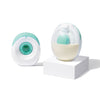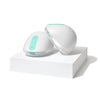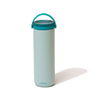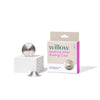Ah, the beauty of changing seasons, bringing with them bursts of color and a symphony of nature.
However, for many, the arrival of spring or fall also means the unwelcome return of seasonal allergies. The sneezing, the itchy eyes, the constant battle with pollen—it's a familiar inconvenience for countless individuals.
But what about breastfeeding mothers and their little ones? Turns out, seasonal allergies can cast their shadow on this beautiful bonding experience.
In this guide, we'll dive into the impact of seasonal allergies on both breastfeeding moms and babies, uncovering everything you need to know to navigate through the sniffles and sneezes of the allergy season.
An Overview of Seasonal Allergies
Seasonal allergies, often referred to as hay fever or allergic rhinitis, are immune responses triggered by allergens present in the air during specific times of the year. Common culprits include pollen from trees, grasses, and weeds, as well as mold spores. These allergies cause different symptoms, from sneezing and nasal congestion to itchy eyes and throat.
Seasonal allergies can add an extra layer of challenge for breastfeeding mothers and babies. Moms may find themselves grappling with annoying symptoms while tending to their little ones. The uncertainty about using medications to alleviate these symptoms and manage illness during breastfeeding can also be a common concern.
Benefits of Breastfeeding Babies with Seasonal Allergies
Breastfeeding is not just a source of nourishment; it's a powerhouse of immune-boosting benefits for babies. Even with seasonal allergies, breastfeeding still has tremendous benefits. Let's explore some of these together.
Immune System Support
Breast milk is made up of antibodies, enzymes, and immune-boosting cells that can actively support a baby's developing immune system. The unique composition of breast milk helps strengthen a baby's defenses, potentially aiding in their resilience against seasonal allergens.
Antibodies and Nutrients
The antibodies passed on through breast milk act as a personalized defense mechanism against different allergens, providing an extra layer of protection for baby. Additionally, breast milk is a rich source of nutrients, contributing to overall health and aiding in the development of a robust immune system. How amazing is that?
Possible Allergy and Asthma Reduction
Research suggests that breastfeeding may play a role in reducing the risk of allergies and asthma in children. While the mechanisms are complex, the protective components in breast milk are believed to contribute to a decreased likelihood of developing these conditions later in life. Again – pretty amazing.
Challenges of Breastfeeding with Seasonal Allergies
We know this journey is a wild mix of joy, cuddles, and, let's be real, a few challenges thrown in for good measure. Now, add seasonal allergies to the mix, and things can get a bit tricky. One hurdle we're diving into is the struggle of a poor latch, particularly due to congestion. Let's chat about how these sneezy, sniffly moments can impact breastfeeding and what we can do to power through.
Poor Latch
When babies are congested, getting a proper latch can become a struggle, making feeding sessions less effective. Before feeding, consider using a saline solution to gently clear your baby's nasal passages. A bulb syringe or a nasal aspirator can help remove extra mucus, allowing for better breathing and an improved latch.
A poor latch can also have a ripple effect on a mom’s milk supply. If the baby isn't efficiently emptying the breast during feeds, it signals to the body that less milk is needed. To counteract this, consider incorporating pumping sessions after nursing. This helps ensure proper breast emptying and contributes to maintaining or even increasing milk supply.
Medication Decreasing Supply
Let's get real about another challenge on the breastfeeding journey—medications. When seasonal allergies hit, reaching for relief might be tempting, but some medications could throw a curveball at your milk supply.
So here's the scoop: certain allergy medications have the potential to decrease your milk supply. It's not the news you want to hear, especially when you're amid sniffles and sneezes. But, don't fret just yet.
According to Akron Children's Hospital, the good news is that many allergy medications are considered safe during breastfeeding. However, it's crucial to play it smart and ask your doctor before taking anything.
The last thing you likely want is to trade your sneezes for a dip in milk supply. So, always keep those lines of communication open with your healthcare team. They'll help you find that sweet spot between relief and keeping the milk flowing for your baby.
Tips for Surviving Breastfeeding with Seasonal Allergies
Breastfeeding with seasonal allergies might feel like a challenge, but fear not! With a few savvy tips, you can sail through these sniffly times. Let's dive into some practical strategies to keep you and your baby comfortable on this breastfeeding adventure.
Maintain Good Hygiene
Good hygiene isn't just about cleanliness; it's your secret weapon against allergens. Regularly dusting, vacuuming, and keeping your living space allergen-free can create a cozy haven for breastfeeding. Minimizing exposure to allergens means less sneezing and sniffles during those precious nursing sessions.
Modify Your Diet
Believe it or not, what you eat can influence allergy symptoms. Consider tweaking your diet to include more anti-inflammatory foods. Omega-3 fatty acids, found in fish and flaxseeds, and antioxidants from fruits and veggies can potentially ease allergy woes, making breastfeeding a smoother ride.
Try Home Solutions For Relief
Before reaching for medications, explore home solutions for relief. Nasal saline drops or rinses can help clear congestion without impacting your milk supply. Natural remedies like honey and ginger tea might offer some soothing relief, contributing to a more enjoyable breastfeeding experience.
Keep Congestion Loose
To ensure a good latch and comfortable feeding, focus on keeping both your and your baby's congestion in check. Steamy showers, saline nasal drops, or a humidifier can be your allies in keeping airways clear. An unobstructed nose makes for smoother breastfeeding sessions.
Hydrate
Staying hydrated is a game-changer. It not only supports your overall health but can also help alleviate allergy symptoms. Hydration keeps mucus membranes moist, easing congestion and ensuring you and your baby can enjoy breastfeeding without unnecessary hiccups.
Let Willow Help You Throughout Your Feeding Journey
Navigating breastfeeding with seasonal allergies can be a rollercoaster, but here's a secret weapon to add to your arsenal: Willow. More than just a pump, Willow is your companion throughout the feeding journey.
Sure, Willow is known for its innovative breast pumps, but did you know there's a treasure trove of information waiting for you on the Willow blog? From breastfeeding tips and hacks to insights on managing allergies while breastfeeding, the Willow blog is your go-to resource for all topics of breastfeeding and pumping.



















